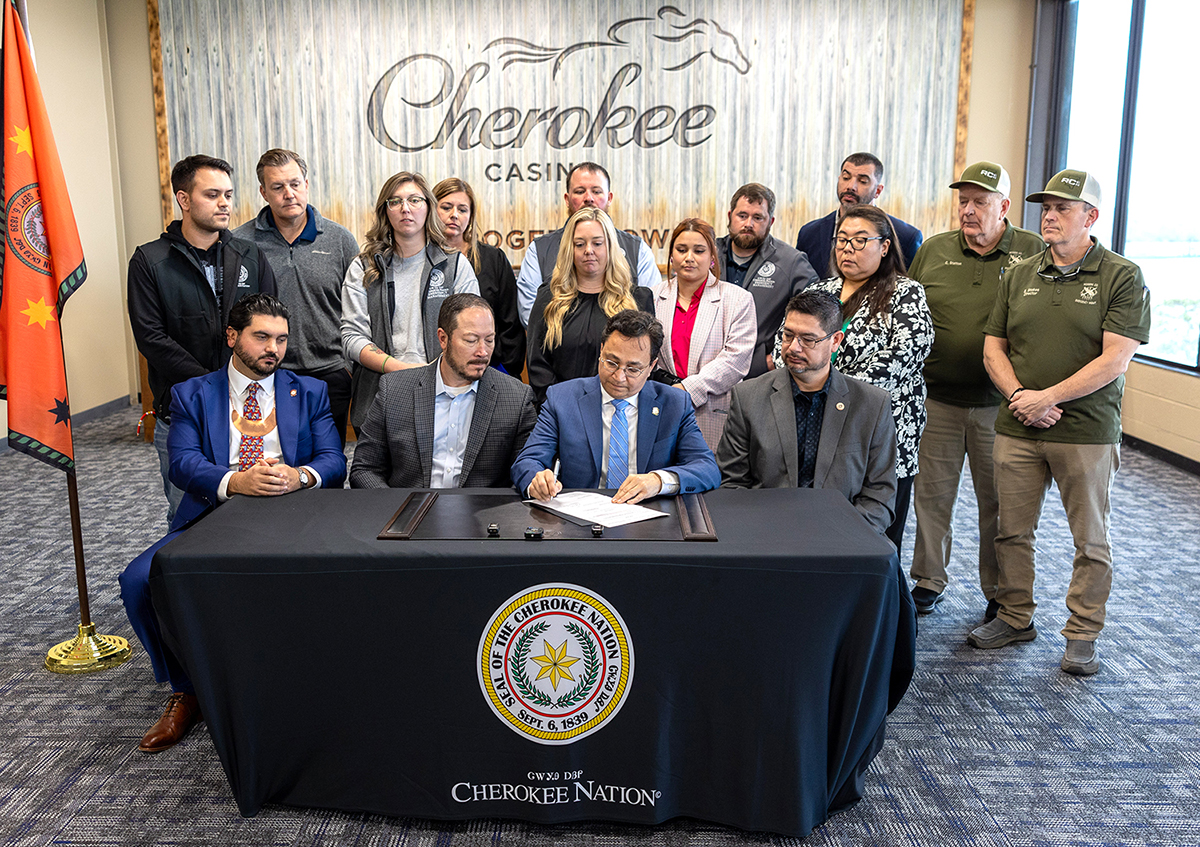CLAREMORE, Okla. — Cherokee Nation Principal Chief Chuck Hoskin Jr. on Tuesday signed into law the 2025 Cherokee Nation Emergency Management Act, reinforcing the Nation’s preparedness and response to emergencies and safeguarding Cherokee communities and citizens during critical times.
The legislation establishes the Community and Citizens Emergency Response Fund, which will provide critical resources during emergencies. The fund, which will be sustained by general and federal revenues, ensures financial resources are available for initiatives such as emergency food distribution, temporary shelter, disaster cleanups, and economic support for citizens impacted by emergencies.
The fund will be maintained at a minimum balance of $1 million by the end of fiscal year 2025 and can grow to as much as $5 million.
“These measures are a significant step forward in protecting the Cherokee Nation and ensuring the safety and well-being of our citizens,” said Principal Chief Chuck Hoskin Jr. “By signing this Act into law, we are building a stronger foundation for resilience, community care, and even quicker response in times of need. I want to once again thank the task force we established last year to examine our tribe’s emergency response operations. This legislation is a result of their hard work.”
In August 2024, Chief Hoskin established the task force by executive order. The task force provided its final report in December of 2024 outlining recommendations to improve emergency response.
Key provisions of the legislation include the ability for the Principal Chief to declare an “Anticipated State of Emergency” when a potential emergency is foreseeable, ensuring proactive measures can be taken to protect the Nation. The Act also empowers the immediate activation of the Cherokee Nation’s Gadugi Emergency Response Corps, a volunteer network established to enhance emergency response efforts both within and beyond the reservation.
“This legislation is about protecting our people and our communities,” said Deputy Chief Bryan Warner. “It establishes a clear, intentional process to respond to the worst-case scenarios and ensures we are putting resources where they are needed most. This is about supporting one another in the Cherokee way.”
The Act was officially approved by the Council of the Cherokee Nation during its monthly meeting Monday, Feb. 10.
“We offer our sincerest condolences to everyone who was affected by the string of storms that passed through our Reservation last year,” said Speaker of the Council Mike Shambaugh. “As a member of the Cherokee Nation Task Force on Disaster Response, my fellow task force members focused on improving the tribe’s response to natural disasters. The emergency response fund will continue to grow with the increasing need to respond to natural disasters. As a long-time member of law enforcement, I have the upmost respect to our first responders. This fund along with our recent FEMA signing will continue to improve response systems for our citizens and first responders.”
Though the Cherokee Nation has had emergency response funding in place for years, the expedited mechanisms for funding allocation outlined within the law ensure that resources can reach citizens and communities without unnecessary delays during times of emergency.
“This was a great day within the Cherokee Nation to have in place legislation that allows us to respond immediately to a natural disaster,” said District 15 Councilor Danny Callison. “Whenever I saw the devastation left behind from the Memorial Day tornado my heart was broken, people’s lives scattered for miles. This can never replace but it will help when help is needed.”
“This last year we have taken a hard long look at the tribe’s capacity to respond to natural disasters,” said Deputy Speaker Kevin Easley. “As a sponsor of this bill I’m proud of the progress we’ve made on this issue since the storms affected my district last year.”
Task force members included:
- Corey Bunch, Chief of Staff (Chair)
- Shella Bowlin, Secretary of State (Co-Chair)
- Todd Enlow, Executive Director of Housing Programs and Senior Advisor to the Principal Chief
- Taralee Montgomery, Senior Policy Advisor
- Philip Manes, former Senior Director of Public Safety
- Jennifer Kirby, Executive Director of Human Services
- Mike Shambaugh, Speaker of the Council of the Cherokee Nation (or Speaker’s designated member of the Council)
- Danny Callison, Council of the Cherokee Nation District 15
- Kevin Easley Jr., Deputy Speaker, Council of the Cherokee Nation District 14

